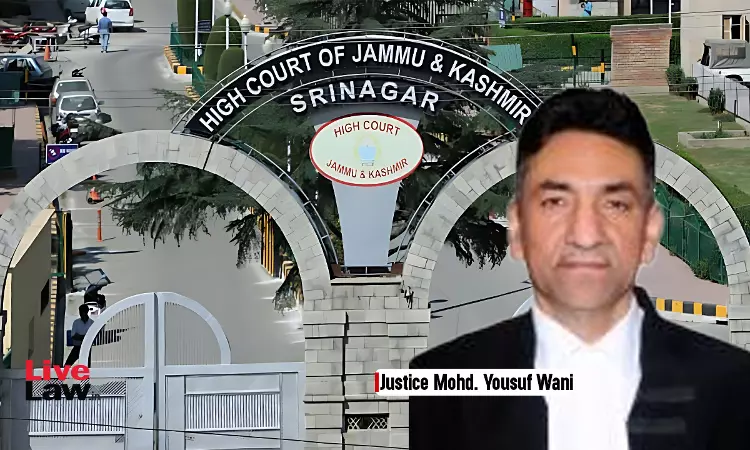- Home
- /
- High Courts
- /
- High Court of J & K and Ladakh
- /
- Trial Judges Relying On Staff For...
Trial Judges Relying On Staff For Drafting Interim Orders Is An Unhealthy Practice, Must Write Or Dictate Orders Themselves: J&K High Court
LIVELAW NEWS NETWORK
2 May 2025 6:44 PM IST
Spotlighting on procedural integrity in the subordinate judiciary, the High Court of Jammu & Kashmir and Ladakh, while dismissing a petition challenging the framing of charges in a forgery case, issued a cautionary note to trial magistrates against delegating the drafting of interim orders including those related to framing of charges to subordinate staff.Justice Mohammad Yousuf...
Spotlighting on procedural integrity in the subordinate judiciary, the High Court of Jammu & Kashmir and Ladakh, while dismissing a petition challenging the framing of charges in a forgery case, issued a cautionary note to trial magistrates against delegating the drafting of interim orders including those related to framing of charges to subordinate staff.
Justice Mohammad Yousuf Wani, emphasized that magistrates are duty-bound to either write interim orders in their own hand or dictate them personally to ensure legal and procedural sanctity.
The case originated from an FIR lodged by the Tehsildar of R. S. Pura, Jammu, against petitioner Ashok Kumar Bhagat. It was alleged that the petitioner had committed offences of cheating and forgery by fabricating documents in a revenue inheritance matter. The allegations led to the registration of FIR under Sections 420, 467, and 468 of the IPC, culminating in the filing of a final police report under Section 193 of the Bhartiya Nagarik Suraksha Sanhita (BNSS), 2023.
The petitioner, claiming to be the sole legal heir as a West Pakistan Refugee of 1947, challenged the framing of charges S. Pura, Jammu. His primary contention was that the order was non-speaking and devoid of judicial application of mind, warranting its quashment along with the final police report.
Justice Wani meticulously examined the pleadings, documents, and the trial court record, observing at the outset that the FIR and the final report prima facie disclosed the commission of cognizable offences including cheating, forgery, and fabrication of false evidence. The High Court held that interference at the pre-trial stage is warranted only in cases involving clinching exculpatory evidence, which was absent in the present case.
The Court reiterated the settled legal principle that at the stage of framing charges, a court is not to conduct a detailed inquiry akin to a trial but must assess whether a prima facie case exists based on the police report and supporting documents. Even a strong suspicion, the Court held, can justify the framing of charges.
Justice Wani underlined that the registration of the FIR, investigation by the police, and the submission of the charge sheet were lawful and proper. However, he concurred with the petitioner's counsel that the trial court's charge-framing order lacked proper reasoning and legal structure.
Lamenting an emerging practice in subordinate courts Justice Wani recorded,
“It is being observed that most of trial Magistrates entrust the drafting of the interim orders including orders regarding framing of charge to the subordinate staff, upon hearing the cases, under their verbal directions. The Magistrates are required to either write the interim orders under their own hand or let them be typed in their presence and under their own dictation.”
While dismissing the petition for lack of merit, the Court granted a significant relief to the petitioner by directing the trial magistrate to reassess the charges framed. Justice Wani instructed,
“The Trial Court shall see whether in the facts and circumstances of the prosecution case, the offences mentioned in the order dated 06.10.2024 are attracted or not. He shall provide an opportunity of being heard to the Counsel for the petitioner in that behalf and shall modify or alter the charge, if any, required in accordance with the law.”
Case Title: Ashok Kumar Bhagat Vs UT Of J&K
Citation: 2025 LiveLaw (JKL) 173



